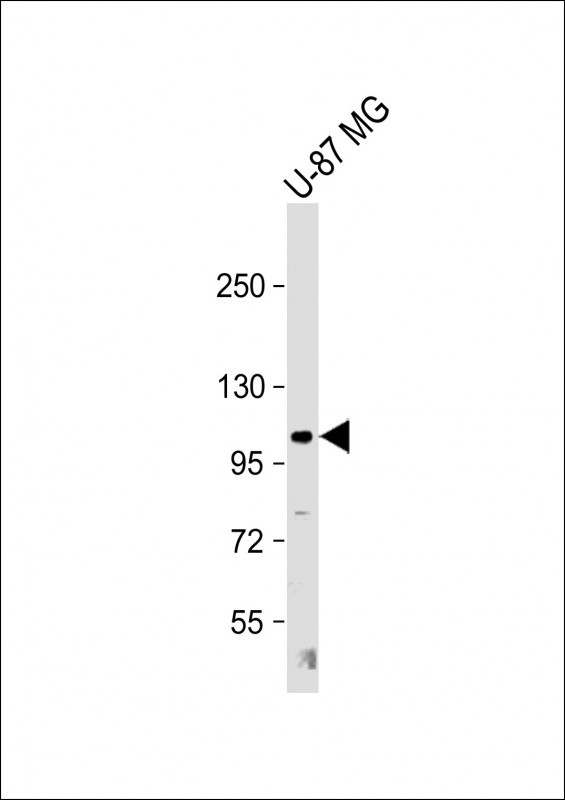
| WB | 1/2000 | Human,Mouse,Rat |
| IF | 咨询技术 | Human,Mouse,Rat |
| IHC | 咨询技术 | Human,Mouse,Rat |
| ICC | 技术咨询 | Human,Mouse,Rat |
| FCM | 咨询技术 | Human,Mouse,Rat |
| Elisa | 咨询技术 | Human,Mouse,Rat |
| Aliases | Thrombospondin-4, THBS4, TSP4 |
| Entrez GeneID | 7060 |
| WB Predicted band size | 105.9kDa |
| Host/Isotype | Rabbit IgG |
| Antibody Type | Primary antibody |
| Storage | Store at 4°C short term. Aliquot and store at -20°C long term. Avoid freeze/thaw cycles. |
| Species Reactivity | Human, Mouse, Rat |
| Immunogen | This THBS4 antibody is generated from rabbits immunized with a KLH conjugated synthetic peptide between 932-961 amino acids from the C-terminal region of human THBS4. |
| Formulation | Purified antibody in PBS with 0.05% sodium azide. |
+ +
以下是关于THBS4 (C-term)抗体的3篇参考文献,按您的要求整理:
1. **"THBS4 promotes cell proliferation and metastasis in gastric cancer via the TGF-β signaling pathway"**
- **作者**: Zhang, L. et al.
- **摘要**: 该研究通过THBS4 (C-term)抗体检测胃癌组织中THBS4蛋白的C端表达,发现其过表达激活TGF-β通路,促进肿瘤增殖和转移,并与患者不良预后相关。
2. **"C-terminal domain of THBS4 regulates pancreatic cancer stromal remodeling and immune evasion"**
- **作者**: Chen, Y. et al.
- **摘要**: 利用THBS4 (C-term)抗体进行免疫组化和免疫共沉淀实验,揭示THBS4的C端结构域通过调控肿瘤基质重塑,增强胰腺癌的免疫抑制微环境。
3. **"THBS4 interacts with integrin α2 to mediate cardiac fibrosis in pressure-overloaded hearts"**
- **作者**: Wang, H. et al.
- **摘要**: 研究使用THBS4 (C-term)抗体进行Western blot和免疫荧光,证实THBS4 C端与整合素α2结合,驱动心肌纤维化,为心力衰竭提供了潜在治疗靶点。
4. **"Prognostic value of THBS4 in colorectal cancer and its role in angiogenesis"**
- **作者**: Liu, J. et al.
- **摘要**: 通过THBS4 (C-term)抗体检测结直肠癌样本,发现高表达THBS4 C端区域与血管生成标志物(如VEGF)正相关,提示其作为预后生物标志物的潜力。
以上文献均涉及使用THBS4 (C-term)抗体进行蛋白定位、表达分析或功能机制研究,涵盖肿瘤、心血管疾病等领域。
The THBS4 (C-term) antibody targets the C-terminal region of Thrombospondin-4 (THBS4), a member of the thrombospondin family involved in extracellular matrix (ECM) remodeling, cell adhesion, and tissue repair. THBS4 is a calcium-binding glycoprotein secreted by various cells, including fibroblasts and cardiomyocytes, and plays roles in cardiovascular development, inflammation, and cancer progression. Its C-terminal domain contains conserved sequences critical for interactions with ECM components, growth factors, and cell surface receptors, influencing cellular signaling pathways.
This antibody is commonly used in research to study THBS4 expression, localization, and function in physiological and pathological contexts. By specifically recognizing the C-terminal epitope, it helps detect full-length THBS4 or its cleavage products in techniques like Western blotting, immunohistochemistry, and immunofluorescence. Studies utilizing this antibody have linked THBS4 to myocardial infarction, fibrosis, and tumor metastasis, where its dysregulation may serve as a biomarker or therapeutic target. For example, elevated THBS4 levels correlate with cardiac remodeling in heart failure and stromal activation in cancers.
Validation of THBS4 (C-term) antibody specificity often involves knockout controls or peptide blocking assays. Researchers prioritize this antibody for investigating post-translational modifications or protein-protein interactions mediated by the C-terminal domain, which are essential for THBS4’s regulatory roles in tissue homeostasis and disease.
×